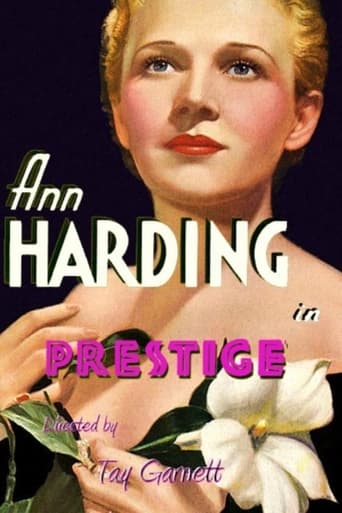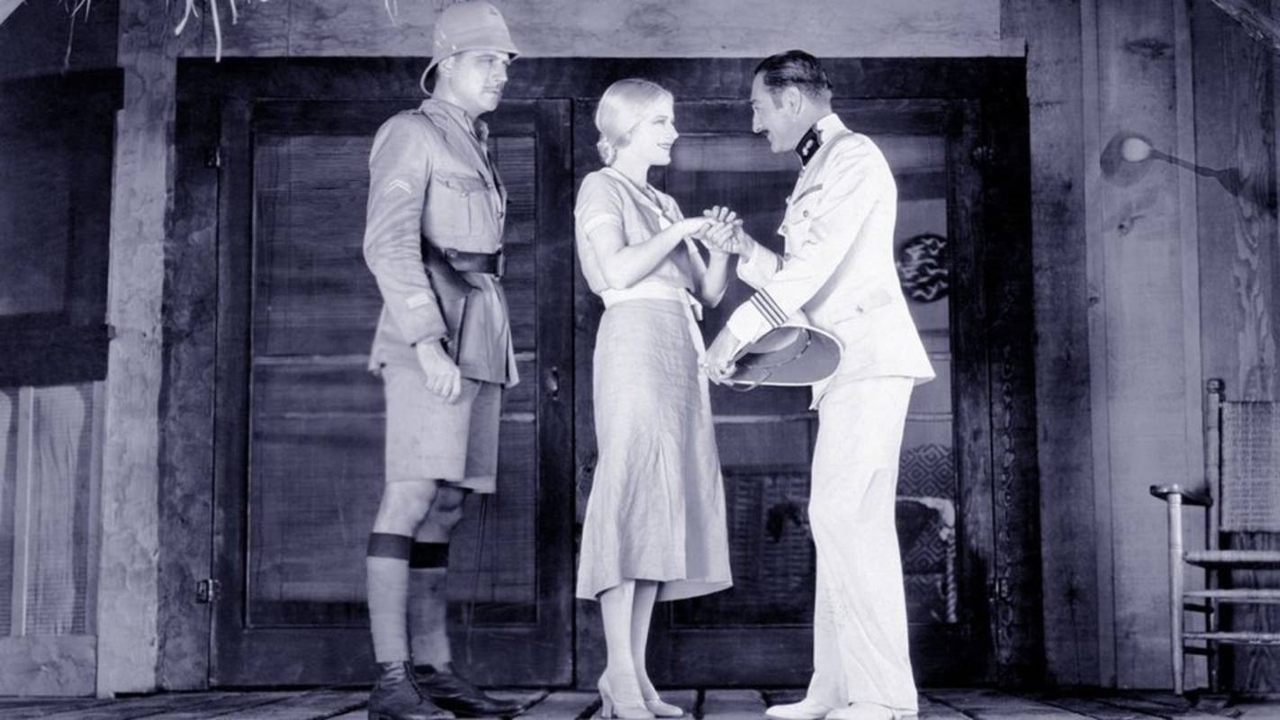blanche-2
I think what one reviewer said is true - people in North America in those days had not a clue what Vietnamese looked like, as many in the penal colony shown in "Prestige" are black. This film has to do with colonialism, and the power or prestige, if you will, of the white man. It was filmed in Florida; somehow Hollywood often made you believe their sets or U.S. locations were Europe or the Tropics or the jungle.Prestige is not in great shape and some of it was difficult to understand. Melvyn Douglas is a French officer in the army, assigned to oversee a penal colony in Indochina.Capt. Andre Verlaine (Douglas) is engaged to marry the lovely Therese Du Flos (Ann Harding), but when he finds out where he's going, the marriage is put off. She has another man interested -- Remy (Adolphe Menjou). After a while, though, Therese talks her father (Ian McLaren), a Colonel, into letting her join Andre.Unfortunately for her, Andre is a bit like Jack Nicholson in The Shining. He gets where he's going and turns into a whack job almost immediately. When Therese arrives, he's passed out on the floor from booze. He's been driven crazy by the heat, the bugs, the humidity, and the isolation.He and Therese marry and he makes an attempt at straightening himself out, and Therese tries to adapt to the country. Meanwhile, Andre is trying to get a transfer.When Remy arrives and informs Andre that he has to stay at the post indefinitely, he snaps and becomes jealous of Remy and Therese, believing she wants to be with him.Tay Garnett, who directed, was trying out some new camera work in this film, doing tracking shots and using a lot of dolly shots. Originally in films, the camera couldn't be moved - I think many directors were experimenting with this new freedom.I did see some criticism of the acting. Let me say it was very 1930s. Melvin Douglas had many mood changes, and they were very dramatic ones No matter what his instinct told him -- and I feel he was one of the greatest actors ever -- the style in those days was way, way over the top as compared to now. If he came off as unstable and almost like a multiple personality, it's because, let's face it, the character probably was just that. Not a well man by any stretch. Douglas had so few opportunities to do anything with a range in it until his older years, it was kind of nice to see him do this.Odd movie, depressing in spots, its point of view strange, but it's a good study of what colonialism was like.
LeonLouisRicci
"Race" has become a Hot Topic in the Media brought to the Forefront by the Election of the First Black President of the United States. Of Course the Scourge of Bigotry is Still Around, but We sure have Come Along Way.Colonial Rule in South East Asia is On Display in this Pre-Code Film and is Considered Honorable, Patriotic, and the Movie Makes it Clear that to Uphold the "Prestige" of the White Man is a Noble and Proud Thing, and the Darker Races are Less than Human. Director Tay Garnett Makes All of this "Artistic" with a Fluid Camera. Like a Kid with a New Toy, He uses the, Recently Released from its Immobility, Camera to Dolly Continuously and it Adds a New Dimension to the Art of Cinema and Considering the Cumbersome Technical Tools of the Time, it is Rather an Amazing Display of Daring.Overly Empathetic Viewers will Cringe and May have a Tough Time Sitting through the Ethnocentricities of the Film. There is Torture, Executions, and Generally the Locals are Treated like Animals. There's Some Creepy Stuff here and it Reminds of "Island of Lost Souls" (1933) with its Third Act as the Natives become Restless and are Out for Revenge.The Power, or "Prestige" if You will, of the White Man is Brought Home with Melvyn Douglas Beating Off a Horde of Haughty Types with Nothing More than a Belt and a Dirty Look. The Movie is So Much a Sign of its Time and is Recommended for a Sweaty and Sometimes Depressing Peak at Attitudes of the Day through the Adventurous Setting Worlds Away from the Homeland, but Not Really.
whpratt1
This 1931 film held my interest for about 30 minutes into the film which was filmed on location in Venice, Florida instead of a Indochinese jungle location. Lt./Capt. Andre Verlaine, (Melvyn Douglas) intends to marry a woman he is very much in love with and is given news that he is going to be assigned to a penal colony and there is no place for a woman to live. The woman is Therese Du Flos Verlaine, (Ann Harding) who is very upset about this assignment by the British Army. However, Capt. Remy Boudoin, (Adolphe Menjou) is very interested in Therese and is the man sending Andre to this penal colony to separate him from his love and seek her attention for himself. This story drags on with lots of boozing by Andre and he begins to lose respect from his fellow soldiers who are all natives. If you like Ann Harding and Melvyn Douglas, this is the film for you.
jaykay-10
Like virtually all films of its era that deal with Africa, the Middle East and the Far East, this one is totally matter-of-fact about the impact of colonialism on the affected nations and their people, and instead concentrates on the hardships suffered by Europeans assigned there. Melvyn Douglas, ordered to command a penal colony in French Indo-China, falls victim to heat, boredom, loneliness; so severe is his decline into alcoholism and despair that not even the arrival of his beloved, Ann Harding, is able to pull him out of it for long.The prisoners would gladly trade his problems for their own. What lifts this melodrama out of the realm of the ordinary is the outstanding work of director Tay Garnett, particularly his use of a very mobile camera and the construction of perhaps a dozen long tracking shots that are stunning to behold. It is always notable when conventional material is transformed into on-screen excellence by the talent behind the camera, as well as in front of it. Here is a prime example.


 AD
AD


